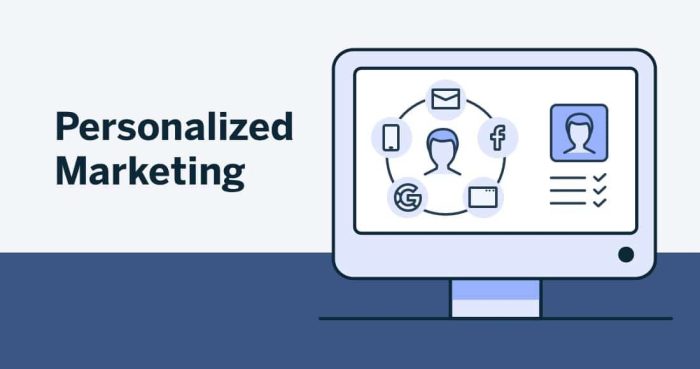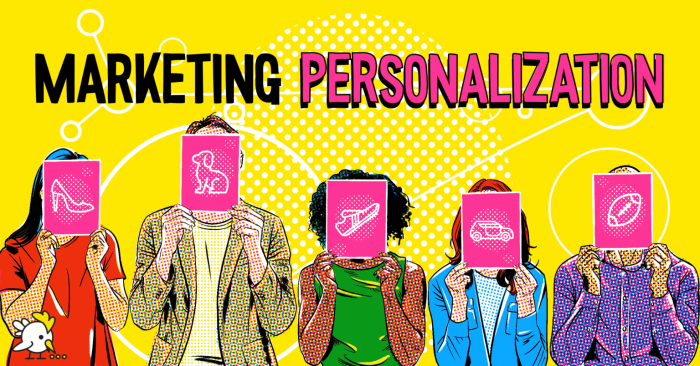Personalization in Marketing sets the stage for this enthralling narrative, offering readers a glimpse into a story that is rich in detail with american high school hip style and brimming with originality from the outset.
When it comes to marketing, personalization is more than just a buzzword – it’s a powerful tool that can take your campaigns to the next level. By tailoring your messages and content to individual preferences, you can create a deeper connection with your audience and drive better results. In this guide, we’ll explore the ins and outs of personalization in marketing, from defining what it is to discussing different strategies, tools, and challenges.
Definition of Personalization in Marketing
Personalization in marketing refers to the practice of tailoring marketing messages, products, and services to specific individuals based on their preferences, behaviors, and characteristics. It involves using data and technology to create customized experiences for consumers, ultimately aiming to enhance engagement and drive conversions.
Why Personalization is Essential in Modern Marketing Strategies
In today’s digital age, consumers are inundated with a constant stream of marketing messages. Personalization helps cut through the noise by delivering relevant content that resonates with individual preferences. By creating personalized experiences, brands can build stronger connections with consumers, increase brand loyalty, and ultimately drive sales.
Benefits of Incorporating Personalization into Marketing Campaigns
- Increased Engagement: Personalized content is more likely to capture the attention of consumers and encourage them to interact with the brand.
- Improved Customer Experience: By delivering tailored messages and recommendations, brands can enhance the overall customer experience and satisfaction.
- Higher Conversion Rates: Personalization can lead to higher conversion rates as consumers are more likely to make a purchase when presented with relevant offers.
- Enhanced Brand Loyalty: When consumers feel understood and valued by a brand, they are more likely to remain loyal and continue to engage with the brand over time.
Types of Personalization Strategies

Personalization in marketing involves tailoring content and experiences to individual customers based on their preferences and behaviors. There are several types of personalization strategies that companies use to connect with their target audience on a more personalized level.
Dynamic Content
Dynamic content involves changing website content or advertisements based on user behavior, demographics, or preferences. For example, Amazon uses dynamic content to show product recommendations based on a customer’s browsing history and purchase behavior.
Product Recommendations
Product recommendations are personalized suggestions for products or services that a customer may be interested in based on their past purchases or browsing history. Companies like Netflix use product recommendations to suggest movies or TV shows based on a user’s viewing history.
Personalized Emails
Personalized emails are customized messages sent to individual customers based on their preferences or interactions with a brand. For instance, Spotify sends personalized emails to users with music recommendations based on their listening history.
Location-Based Personalization
Location-based personalization involves delivering targeted content or promotions to customers based on their geographical location. For example, Starbucks uses location-based personalization to send customers offers or discounts when they are near a store.
Behavioral Targeting
Behavioral targeting uses data on a customer’s online behavior to deliver personalized content or ads. Websites like Facebook use behavioral targeting to show users ads based on their interests, likes, and online activities.
Tools and Technologies for Personalization

Personalization in marketing is made possible through a variety of tools and technologies that help companies tailor their messaging and offerings to individual customers. These tools not only enhance customer experience but also drive engagement and increase conversion rates.
Popular Tools and Technologies
- Customer Relationship Management (CRM) software: CRM systems like Salesforce and HubSpot allow businesses to track customer interactions and preferences, enabling personalized communication.
- Marketing Automation Platforms: Tools such as Marketo and Pardot automate marketing processes and deliver personalized content based on customer behavior.
- Personalization Engines: Platforms like Adobe Target and Optimizely use data and algorithms to deliver personalized content and recommendations in real-time.
- Data Management Platforms (DMPs): DMPs collect and analyze customer data from various sources to create detailed customer profiles for personalization.
Artificial Intelligence and Machine Learning in Personalized Marketing
Artificial intelligence (AI) and machine learning play a crucial role in transforming personalized marketing by analyzing vast amounts of data to predict customer behavior and preferences. These technologies enable real-time personalization at scale, allowing companies to deliver relevant content to each customer.
Case Studies
- Amazon: The e-commerce giant uses AI algorithms to recommend products based on customer browsing and purchase history, leading to increased sales and customer satisfaction.
- Netflix: By leveraging machine learning, Netflix offers personalized recommendations for movies and TV shows, keeping users engaged and reducing churn rates.
- Spotify: Spotify’s personalized playlists and music recommendations are powered by AI, enhancing the user experience and increasing user retention.
Challenges and Solutions in Personalization: Personalization In Marketing
Implementing personalization strategies in marketing can come with its fair share of challenges. From data privacy concerns to technology limitations, marketers often face obstacles in creating effective personalized experiences for their target audience. However, with the right solutions and best practices, these challenges can be overcome to improve personalization efforts and drive better results.
Data Privacy Concerns
Data privacy is a major concern when it comes to personalized marketing. Consumers are becoming increasingly aware of how their data is being used, leading to stricter regulations and demands for transparency. To overcome this challenge, marketers should prioritize obtaining explicit consent from users before collecting their personal information. Additionally, implementing robust data security measures and being transparent about how data is being used can help build trust with customers.
Technology Limitations, Personalization in Marketing
Another common challenge in personalization is the limitations of existing technology. Marketers may struggle with integrating data from various sources, creating seamless omnichannel experiences, and delivering real-time personalization at scale. One solution to this challenge is investing in advanced personalization tools and technologies that can automate data collection, analysis, and content delivery. Leveraging artificial intelligence and machine learning algorithms can also help marketers optimize personalization efforts and enhance customer experiences.
Ethical Considerations
Maintaining ethical standards in personalized marketing is crucial to avoid crossing boundaries and damaging brand reputation. Marketers should always prioritize customer consent, respect user preferences, and avoid manipulating or misleading consumers through personalized content. By following ethical guidelines and best practices, marketers can ensure that their personalized marketing efforts are not only effective but also respectful of customer privacy and trust.